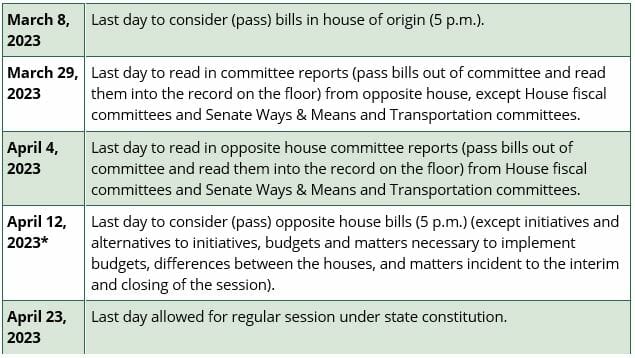The State Legislature ended its session on Sunday, April 23 at 10 pm. .Several bills which seek to increase housing supply, reduce building costs, and update agency law received strong support in the legislature and were delivered to the Governor for his signature.
Below is a list of some of the highest priority bills for our industry. A full list of bills being monitored by Washington REALTORS® during the 2023 session may be found HERE.
HB1110 - Allow Middle Housing in Cities
STATUS: HB 1110 passed out of the House with concurrence on April 18 and was delivered to the Governor for his signature on April 21.
“Middle Housing” types are duplex to six-plex units, townhouses, cottage houses, and other smaller housing types that fit within existing residential neighborhoods. The lack of housing supply is caused by lack of building land, and antiquated city zoning that locks up over 70% of residential land solely for single-family housing. Allowing middle housing in all residential areas would still allow single-family housing, but provide more options to increase housing supply and affordable homeownership.
SB 5191 - Reforming Real Estate Agency Law
STATUS: SB 5191 passed from the Senate on April 14 with concurrence and was delivered to the Governor for his signature on April 20. This law will take effect on January 1, 2024.
Washington State’s real estate agency law, Chapter 18.86 RCW, has not been updated since its adoption in the 1990s. Existing law does not require certain basic consumer protections, and does not reflect modern industry best practices. This legislation will both protect consumers and avoid litigation seen in other states. For example, the bill would improve disclosures of real estate broker duties, require a written buyer agency agreement for a broker to be compensated, require terms of compensation in writing, and ensure that the legal duties of brokers protect all parties in a transaction – not just the broker’s own client.
SHB 1070 - Exempting Residential Sale/Leasebacks from Landlord-Tenant Act
STATUS: SHB 1070 was passed unanimously out of both chambers of the legislature and was signed into law by the Governor on April 6.
When a house is sold, sometimes the seller is not yet ready to move out, or the buyer is not able to move in. In this situation, the buyer and seller will agree to a written “leaseback” as part of the sale so that the seller stays in the house after closing for a certain period of time. This is not a typical landlord-tenant type situation, so this bill would clarify that a sale/leaseback is exempt from the state’s landlord-tenant act.
DEAD BILLS
ESSB 5466 - Transit Oriented Development
Washington State’s multi-billion dollar transit investments necessitate land use and zoning near transit that increases housing supply and community services for transit users. Transit-Oriented Development (“TOD”) regulations would apply in areas next to the largest transit facilities like light rail to ensure that new housing supply is commensurate with the State’s transit investments. Cities would have flexibility to allow different types of TOD near station areas.
SB 5258 - Increasing the Supply & Affordability of Condominiums
Condominiums are the most affordable type of homeownership, but the supply of new condominiums in Washington is among the worst in the country. This bill improves the condominium market by improving the process to repair condominium defects (“Right to Cure”), streamlines the process for construction of smaller condominium projects, ensures reasonable impact fees for condominiums, and provides a condominium tax incentive for certain qualified first-time homebuyers.
HB 1133 / SB 5357 - Allow Detached Accessory Dwelling Units in Rural Areas
The housing supply crisis is not just an urban problem. While some counties have enacted ordinances allowing detached accessory dwelling units (ADUs) in rural areas, other county ADU ordinances have been rejected by the Growth Hearings Boards. In these counties, large attached ADUs could be built, but smaller more affordable ADUs are prohibited. This legislation is based on a recent detached ADU ordinance adopted in Snohomish County with bipartisan and unanimous support, and that was not appealed to the Growth Board. The bill allows detached ADUs, but regulates the size, appearance, and location of detached ADUs in rural areas.
2023 Legislative Session - Important Dates


